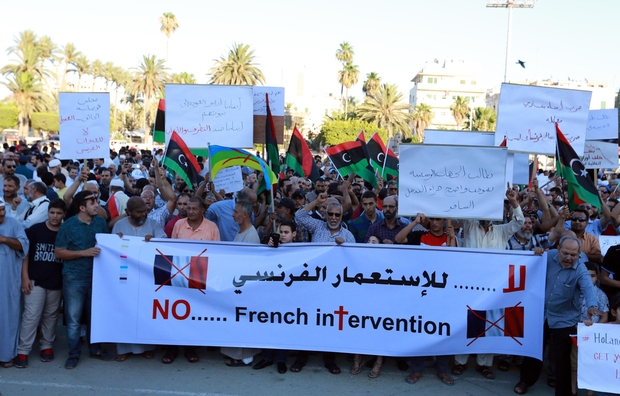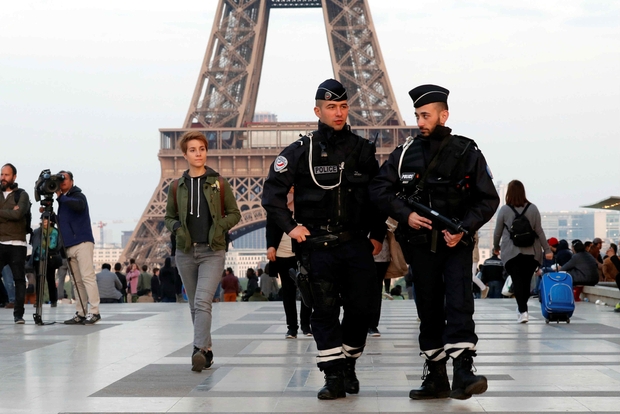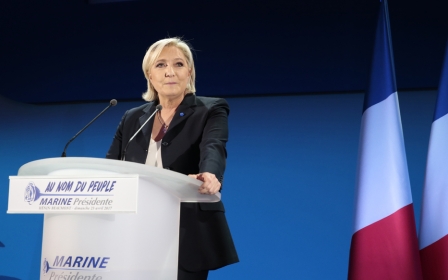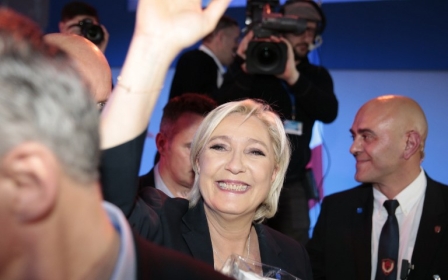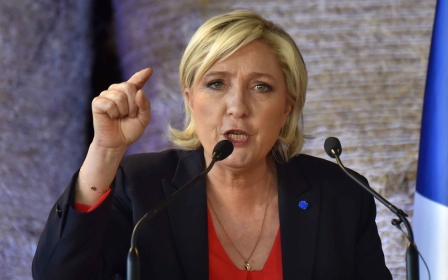ANALYSIS: Splendid isolation - welcome to the world of Le Pen
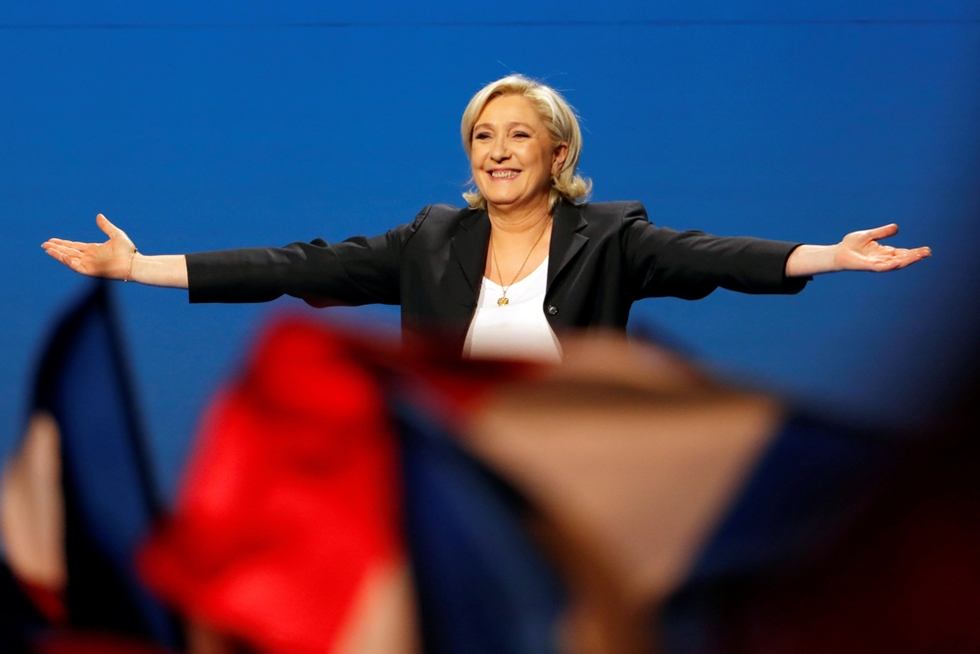
From the outset of her campaign, Marine Le Pen has presented the French presidential election as a battle of two visions: the "globalist, which wants the abolition of borders, both economic and physical, more and more immigration and less cohesion between the French; and the patriotic choice, which wants to protect our national identity, our independence".
The president of the National Front's international programme reflects the party's domestic policy motto of "national preference" - non-alignment, the sovereignty of nations, and the defence of national interests. Her diplomacy has two pillars, "independence and balance", as demonstrated by her willingness to quote Charles De Gaulle: "States have no friends, only interests."
Another major area of her foreign policy is the fight against "Islamism" – which in her world appear as synonymous with terrorism. This is an overview of Le Pen's foreign policy agenda, including in the Middle East, and the challenges she will face in realising her vision of France under the National Front.
France's place in the world
Le Pen intends to engage France "in the service of a multipolar world based on the legal equality of nations, their permanent consultation, and the respect of their independence". On the basis of realism, she hopes that France will resume its role as a "power of stability and balance".
This implies a reduction of French interventionism abroad. She thinks that "during the last 10 years, France has been a warmonger, France has thought that it had resolved by means of war what are political, religious and ethnic issues whose complexity excludes any simple solution".
Le Pen's France will also capitalise on "the links between peoples who have the French language in common", as well as a policy of "co-development with the countries of Africa, based primarily on development aid".
Nato: Le Pen intends, if elected, to leave Nato's integrated military command structure "so that France will not be drawn into wars that are not its own".
To counterbalance this withdrawal, she wants to provide the country with an autonomous defence capability in all areas. This requires increasing the defence budget to three percent by the end of her term, and gradually restoring mandatory military service.
Europe: This is the first of the 144 points included in her manifesto. If elected, negotiations will be initiated with France's European partners, followed by a referendum on membership of the EU. "The objective is to get to a European project which is respectful of both the independence of France and national sovereignties, and which serves the interests of the people," it says.
Le Pen wants to re-establish national borders and exit the visa-free Schengen area of Europe.
The US: Le Pen's thoughts are clear: the US has shown a "strategic adventurism that may have led them to undermine what we consider as our interests". She lists "the destruction of Iraq, of Syria, of Libya with the influx of millions of migrants; dangerous games with Islamist militias; the strengthening of the Russian presence in the Mediterranean; the concerns of Turkey".
The US, she says, "has become both the incontestable long-term ally and sometimes, it must be said, almost an adversary".
Russia: According to Le Pen, Russia has been "mistreated by the EU, she was mistreated by a vassalised France".
Le Pen also notes that Russia "has regained a foothold in the Middle East", making Moscow "an essential interlocutor". Therefore, France "must endeavour to tie Russia to the European continent, because such is the world order, but above all because it is in the interest of the countries of Europe".
The Middle East
Le Pen's policy on the Middle East is focused almost exclusively on the angle of "jihadism".
Egypt: During her trip to Egypt in May 2015, the she praised the president, Abdel Fattah al-Sisi, as "one of the leaders with the clearest message about fundamentalism". According to her, Egypt and the UAE are at the forefront of the "countries fighting fundamentalism".
Libya: In Libya, Le Pen believes that with the intervention against Muammar Gaddafi, former president Nicolas Sarkozy triggered an "Islamist wave throughout Sahelian Africa", of which Mali "is likely to be only the first piece".
"Wanting to impose democracy by means of missiles was unrealistic in a country deeply marred by tribal and regional divisions, in a part of the world distorted by radical Islam," she said.
She also observed that France "allowed itself to be dragged into, or dragged itself, into wars which were not its own, in the name of interests which were not its own, and which were sometimes contrary to the UN resolutions and to the stated objective of maintaining peace and protecting civilian populations".
For her, the 2011 UK-France intervention in Libya exceeded the mandate of the UN. On refugees, Le Pen says Libya must "protect Europe from the influx of sub-Saharan refugees".
Algeria: France's relations with Algeria are still entrenched in the effects of the war of independence, the memory of which remains vivid in a part of the National Front electorate.
Le Pen knows how to exploit this wound: "The National Front has supported with all its strength the repatriated from Algeria." Le Pen has made much of her support for the harkis, Muslim Algerians who served as auxiliaries in the French Army during the Algerian independence war from 1954 to 1962. "I think they were ill-treated, ill-received in their country; they were put in camps in appalling conditions."
As for the colonisation, she affirmed that it has "brought much, in particular to Algeria: hospitals, roads, schools. Even Algerians who are in good faith admit it."
Turkey: In Turkey, Le Pen believes its "behaviour was ambiguous to say the least with regard to the Islamic State.
"In the fight against the Kurds, they [Turkish officials] are at least suspected of having facilitated for months the work of the Islamic State."
She also denounced the process of Turkey's accession to the EU, which she said was "against the obvious will of the majority of Europeans".
For Le Pen, Turkey is not European, "neither geographically, culturally, nor historically".
Syria: In Syria, Le Pen believes that support for "supposedly moderate Islamists" has been, and remains, a mistake. Worse, she considers that France has "flouted the international embargo by delivering to the supposed 'Syrian moderate Islamists' weapons which immediately increased the arsenal of IS and which, perhaps, have killed French people".
She also criticised the closure of the French embassy in Syria, "a country that has long preserved a Francophone elite and protected its Christian minorities".
"How many attacks on French soil would have been avoided by maintaining relations with the Syrian services? How many Frenchmen have paid with their lives?" she asked.
Le Pen believes that "either the responsible ministers or the head of state himself were ill-informed (...) or our political leaders put France at the service of other interests. They have served foreign interests against the security of France and the life of the French".
If France has always made the departure of Syria's president, Bashar al-Assad, an unsurpassable imperative, Le Pen took the opposite stance when she visited Lebanon in February.
"In accordance with the policy of the lesser evil, which is a realistic policy," maintaining Assad at the head of state seems "a much more reassuring solution for France" than IS, "if the latter were to rule Syria".
Translated: "With Russia's President Putin we have, among other things, discussed at length the international situation and Islamist terrorism. MLP"
Israel-Palestine: Le Pen has said little on one of the most pressing problems in the Middle East.
She was not invited to the last dinner of the Representative Council of the Jewish Institutions of France (CRIF), an event that has become almost unavoidable for French political elites.
Francis Khalifat, the president of this powerful, pro-Israel lobby, said he wanted to keep a "cordon sanitaire" around the National Front.
Controversially, Le Pen recently said the modern French state held no responsibility for raids against Jewish citizens during World War Two. The National Front in January gave its third in command, Nicolas Bay, the task of lifting "incomprehension or misunderstandings" surrounding her words on a trip to Israel.
Gulf: Le Pen wants relations with Saudi Arabia and Qatar to end due to alleged links with fundamentalists.
"France must break its relations with Qatar and Saudi Arabia - which helped, assisted, and funded Islamist fundamentalists worldwide.
"Therefore, we cannot be in a coalition with those countries. We must be able to choose our allies, not to ally ourselves with people who in reality have different purposes than ours."
Following the attack claimed by the Islamic State two weeks ago on the Champs-Elysees in Paris, Le Pen FN declared "Qatar and Saudi Arabia benefited from a guilty benevolence".
The home front
In France, Le Pen has vowed to fight terrorism and "prohibit and dissolve organisms of all kinds related to Islamic fundamentalists".
The National Front will "expel all those linked to Islamic fundamentalism, close all extremist mosques identified by the interior ministry, and prohibit foreign funding of places of worship and their staff."
It will "prohibit all public funding of places of worship and religious activities".
Le Pen's approach to the fight against terrorism is based resolutely on security and an end to "judicial laxity". The only extremism that she denounces is "Islamist".
Asylum and refugees: On asylum, Le Pen wishes "to return to the original spirit of the right to asylum, which must only be granted following applications filed in French embassies and consulates in the countries of origin or neighbouring countries". Indeed, she considers that the right of asylum encourages economic migration.
Secularism: Finally, the "promotion of secularism" and fighting "communitarianism" are at the heart of her plans. Secularism is to be extended to the whole public domain, while "communitarianism", as understood by Le Pen, is exclusively linked to "Islamism" and "multiculturalism".
Her plan is to include in the constitution the principle that "the Republic does not recognise any community".
"I think that each French person, including our Jewish compatriots, can understand that if they are asked for a sacrifice in order to fight against the advance of this political Islam they will make this effort," Le Pen said.
On Islam, the FN candidate officially sticks to one principle: "It is not Islam that poses a problem, but its visibility."
For her, the wearing of a veil is a "political act".
New MEE newsletter: Jerusalem Dispatch
Sign up to get the latest insights and analysis on Israel-Palestine, alongside Turkey Unpacked and other MEE newsletters
Middle East Eye delivers independent and unrivalled coverage and analysis of the Middle East, North Africa and beyond. To learn more about republishing this content and the associated fees, please fill out this form. More about MEE can be found here.


